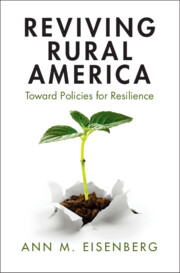Book contents
- Reviving Rural America
- Reviving Rural America
- Copyright page
- Contents
- Figures
- Acknowledgments
- 1 Introduction
- 2 The Foundational Myths
- 3 The Myth of Rural Empowerment
- 4 The Myth of Rural Unsustainability
- 5 The Myth of Rural Decline
- 6 The Myth of Rural Radicalism
- 7 The Myth of Rural Whiteness
- 8 The Myth of Rural Obsolescence
- Index
4 - The Myth of Rural Unsustainability
Published online by Cambridge University Press: 20 June 2024
- Reviving Rural America
- Reviving Rural America
- Copyright page
- Contents
- Figures
- Acknowledgments
- 1 Introduction
- 2 The Foundational Myths
- 3 The Myth of Rural Empowerment
- 4 The Myth of Rural Unsustainability
- 5 The Myth of Rural Decline
- 6 The Myth of Rural Radicalism
- 7 The Myth of Rural Whiteness
- 8 The Myth of Rural Obsolescence
- Index
Summary
This chapter addresses the myth that rural regions are unsustainable due to challenges with economies of scale and the perception that rural life must be “subsidized.” While urban life is commonly viewed as dynamic and efficient, rural life is often considered a waste of resources. These views cause skepticism about investing in, and supporting, rural life more robustly. There are several problems with the myth of rural unsustainability. First, it neglects urban–rural interdependence and the fact that cities are subsidized by rural provision of food, energy, fibers, and other natural and processed resources. Second, the myth discounts the decades-long tradition of utilities and common carrier regulation in the United States. Economic regulation, which was more substantial prior to the deregulatory era since the 1980s, was designed to help facilitate geographic convergence, guard against concentration of resources in mega-cities, create a cohesive national economy, and make the distribution of resources and opportunities across landscapes more equitable. The chapter interrogates the concept of economies of scale, explores overlooked urban dependency, and reviews legal history and legislative debates surrounding transportation and telecommunications regulation, such as through the Interstate Commerce Commission, to make the case that rural communities should and can be sustained, and are thus “sustainable.”
Keywords
- Type
- Chapter
- Information
- Reviving Rural AmericaToward Policies for Resilience, pp. 75 - 98Publisher: Cambridge University PressPrint publication year: 2024

